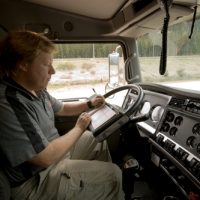Implementation of ELDs in the Trucking Industry

The Federal Motor Carrier Safety Administration (FMCSA) has recently imposed a rule requiring the use of Electronic Logging Devices (ELDs) for most motor carriers and drivers who are currently required to record their duty status data. ELDs automatically track trucks’ service hours, location, speed, and other driving statistics. Drivers have long been required to stay within certain “hours of service” limits, and to keep paper logbooks to document these statistics, both for purposes of compensation and to prove regulatory compliance. However, since there is often a financial incentive to driving long hours and distances, some drivers have kept two logbooks: one with accurate statistics for compensation purposes, and a fraudulent book to show police in case of a stop. One benefit of ELDs is that they can help prevent these practices. The FMCSA says that ELDs can also increase driver efficiency, saving the trucking industry up to $1 billion per year while also preventing 1,844 crashes and saving 26 lives annually. [1]
However, the new rule will be implemented in three phases, giving motor carriers and drivers several years to work towards full compliance. The first phase, called the “Awareness and Transition Phase,” will span from February 16, 2016 until December 18, 2017. During this time, carriers and drivers are instructed to prepare to comply with the rule, and may voluntarily use ELDs during this time. However, they may also use paper logs, logging software, or Automatic On Board Recording Devices (AOBRDs). The second phase, lasting from December 18, 2017 to December 16, 2019, is called the “Phased-In Compliance Phase,” and allows drivers and carriers to use registered, certified ELDs, or AOBRDS that were installed prior to December 18, 2017. The “Full Compliance Phase” does not begin until December 16, 2019, by which time all drivers and carriers must use certified, registered ELDs complying with the new regulation.
Thus, while the FMCSA promises significant safety benefits to the public, the full effects of this rule will not be seen for another four years. This is likely in response to major criticism from the trucking industry, which has called the rule an expensive “big brother” mandate that the trucking industry does not need. However, if ELDs will result in the dramatic reduction in crashes that the FMCSA claims, then the delays in the implementation of this rule will mean more injuries and fatalities for the public.
[1] http://fleetowner.com/ regulations/fmcsa-unveils- final-eld-rule


